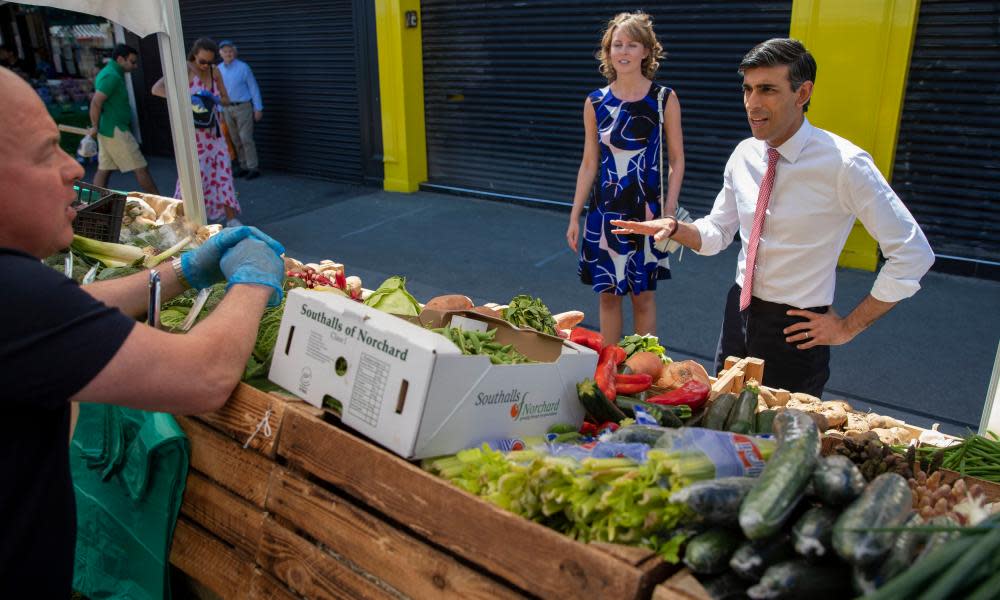Sunak considers £500 vouchers for all UK adults to spend in Covid-hit firms

Radical plans to give all adults £500 and children £250 in vouchers to spend in sectors of the economy worst hit by the Covid-19 crisis are being considered by the Treasury.
The proposals, drawn up by the Resolution Foundation think tank, which has had recent talks with the Treasury about its ideas, are aimed at kickstarting economic recovery by triggering a highly targeted surge in spending. Under the plans the vouchers could only be spent in certain sectors, such as hospitality and “face to face” retail, as opposed to online.
The proposals are similar to successful schemes already used in China, Taiwan and Malta. In April, the Chinese city of Wuhan, where the Covid-19 outbreak is believed to have started, issued 500 million yuan (£57m) in consumption vouchers for use in restaurants, shopping malls, convenience stores, and cultural, sports and tourist venues.
Last night, ahead of a “summer update” on the state of the stricken economy by the chancellor Rishi Sunak on Wednesday, the Treasury refused to rule out introducing a similar scheme in the short or medium term.
The Resolution Foundation says its idea would be a more effective way to jump start a recovery than a temporary VAT cut, or one-off cash gifts from the state to individuals, which have also been considered in Whitehall.
Economists say cash transfers into people’s bank accounts would probably be stashed away into savings by many higher income households, while a VAT cut would do less for lower income families because they tend to spend more of their money on VAT exempt items, or reduced, or zero-rated goods.
The money could be allocated via vouchers or smartcards, and transactions could be made with the use of mobile phones. The think tank suggests a one-year time limit for spending the money and that the scheme, which would cost the state around £30bn, could be closed down in the event of a second wave of Covid-19.
Sources involved in the discussions said the Treasury might balk at a £30bn bill and opt for smaller sums if it takes up the idea, with the possibility that it could increase the value of the vouchers later if the scheme proved effective.
Economic activity in the hospitality sector was down more than 90% in April and there are fears that many sectors will continue to be badly affected while social distancing remains in place. In Germany and France, where lockdown restrictions have already eased, leisure and retail trips remain more than 10% down on pre-crisis levels.
James Smith, research director at the Resolution Foundation, said: “Social distancing has huge implications for firms in sectors like retail, hospitality, tourism and leisure that will last into the reopening phase. That is why the jobs of so many workers in these sectors are in the firing line. The chancellor’s recovery package on Wednesday should reflect this unique economic challenge.
“As well as setting out the biggest ever peacetime job support programme, the chancellor should get Britain spending in places where it’s needed most. A universal high street voucher scheme to be spent only in these sectors would kickstart demand in the right parts of our economy, boost living standards and deliver targeted support to the businesses that need help the most.”
The Treasury declined to comment on the plans saying the chancellor would outline “the next stage in our plan to secure Britain’s recovery” on Wednesday. This will include an extra £32m for the National Careers Service which ministers says will allow a quarter of a million more people to benefit from expert careers advice in their search for jobs. Sunak will say that the government will recruit hundreds more careers advisers – meaning close to 270,000 more people will receive bespoke advice to support them into the world of work.
Meanwhile Labour warns today of “ghost towns” developing across the country as new figures show more than 80,000 hospitality, leisure and retail businesses have missed out on government grants to help them tackle the Covid-19 crisis.
The figures from the Valuations Agency office show that 83,290 retail, leisure and hospitality businesses have received no grant support from government. These businesses, in higher rateable value premises, are often larger employers, with higher turnovers.
Shadow business minister Lucy Powell said: “Unless the government steps up to save the high street many will become ghost towns, with thousands laid off, as a result. Labour is calling on the government to have a back-to-work budget this week, with the focus on protecting and creating jobs.”
Polling by Opinium for the Bright Blue think tank found that more than two in five (44%) of businesses participating in the Coronavirus Job Retention Scheme reported they will have to lay off some, more or all of their furloughed staff when the scheme comes to a close at the end of October.

